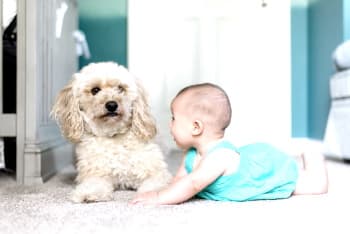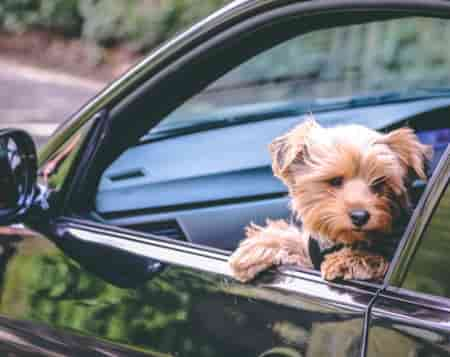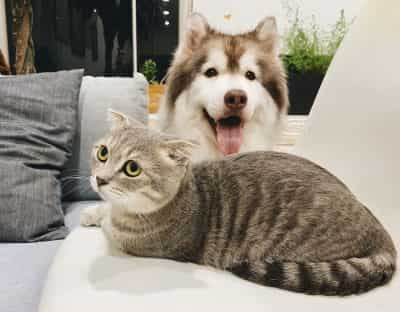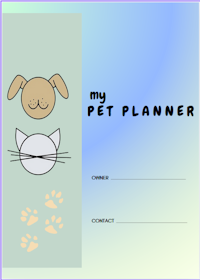Socializing A Puppy
Socializing a puppy is a crucial step in raising a happy, secure and friendly adult dog and begins as soon as you bring him home.
 Courtesy: Pixabay
Courtesy: Pixabay
What is Puppy Socialization and Why Does
It Matter?
Socializing a puppy is all about exposing your little one to new experiences, people, animals, and environments and builds upon what he has already learned from his mother and litter mates.
The goal is to help them grow up to be confident, well-adjusted dogs who aren’t fearful of the world around them. Proper socialization helps prevent behavior issues like anxiety, fear, and aggression later on.
The more experiences a puppy has, the more comfortable they become in different situations. Think of it as laying the foundation for a happy, healthy dog.
The Critical Socialization Window: 3-12 Weeks
Did you know that there’s a “critical period” for socializing a puppy? Between the ages of 3 and 12 weeks, puppies’ brains are like sponges, absorbing all the new experiences they encounter.
In the first few weeks, the breeder begins socialization by introducing puppies to different experiences, sights, smells and sounds. It's important that this process continues when you take your puppy home.
This is when it’s easiest for them to form positive associations with new people, animals, and places.
After 12 weeks, they can still be socialized, but it takes a little more patience and careful work. So, if your puppy is in this window, it’s the perfect time to start introducing them to the world!
Step-by-Step Guide to Socializing Your Puppy
Expose Them to New Environments: Start by taking your puppy to different places like parks, pet stores, or even busy streets with foot traffic and noise (safely, of course!).

These outings give him the opportunity to experience new situations as well as a variety of sights, sounds and scents.
Just be sure the environment is safe and not too overwhelming
and he feels secure in your leadership.
Taking your puppy out for walks in different locations is ideal for gradually meeting all kinds of people while he builds confidence.
Socializing Your Puppy With People: Introduce your puppy to people of all ages and types—children, older adults, people in uniforms—anything that might seem unfamiliar to them later in life.
The more positive encounters they have, the more relaxed they'll be.

Move on to social introductions. Invite friends to visit and set up
approachable low-key situations where your pup will become curious enough to want to get involved.
Don't force interaction, just let it happen casually and naturally.
When you introduce your puppy to people, try to include as many of the differences between people such as:
- both large and small, tall and short
- children and babies
- seniors
- males, females
- people wearing hoodies, hats, uniforms, costumes
- as well as any friendly strangers you may meet out on a walk - perhaps even walking their own friendly dog.
Interacting with Other Dogs and Animals:
If possible, arrange
playdates with other puppies or adult dogs who are friendly and
well-socialized.
If you can’t find another dog, just meeting calm, vaccinated dogs on walks can be helpful too.
Getting Comfortable with Different Surfaces:
Take your puppy on
outings that introduce him to
different surfaces and terrains such as:
- Cement
- Sand
- Wood
- Gravel
- Metal etc. (manholes)
and noises such as:
- Sirens
- Noisy traffic
- Helicopters
- Car horns
- Alarm clocks
- Burglar alarms
And, definitely get him used to doorbells without barking. After all, intruders don't use them!
On the other hand, you never know what may make him afraid, so look for opportunities
to guide him whenever he seems cautious or fearful about new things he encounters.
Using Positive Reinforcement to Encourage Good Behavior
The best way to teach your puppy is through rewards!
Every time your pup does something brave, like greeting a new person calmly or walking on a new surface without hesitation, reward them with praise or a tasty treat.
This helps them associate new experiences with something positive. Keep things upbeat and fun, and your puppy will be more eager to socialize.
How to Spot Stress and What to Do About It
Puppy socialization doesn’t mean pushing your puppy into stressful situations.
Puppies can show signs of stress in different ways—whining, pulling away, or even hiding. If you notice these signs, it’s time to slow down and let your puppy take a break.
Let them observe the situation from a distance or remove them from the situation entirely if needed. Remember, socialization should always be a positive experience!
When To Seek Professional Help
If your puppy seems excessively fearful or aggressive around other dogs or people, or if they show signs of behavioral problems that aren't improving, it might be time to consult a professional trainer or behaviorist.
A trained expert can help you with more advanced techniques and create a customized plan for your puppy.
Common Myths About Puppy Socialization
Myth #1: “Puppies should only play with other
puppies.”
Reality: While playing with other
puppies can be great for learning dog to dog behavior, adult dogs can offer valuable socialization
too.
Calm, well-behaved adults can teach puppies how to behave and interact properly.
Myth #2: “Socializing means exposing my puppy
to everything at once.”
Reality: Slow and
steady wins the race! Overloading your puppy with too many new
experiences at once can overwhelm them and backfire.
Focus on gradual, positive introductions to new things.
Real-Life Success Stories: Socialization In Action
Here’s a quick story from one of our readers, Jenna:
“I adopted a shy puppy named Max. He was really nervous around other dogs, but I started bringing him to puppy classes and arranged playdates with calm dogs. It took time, but now he’s more relaxed and even loves meeting new dogs on our walks!”
These kinds of success stories remind us that with a little patience and consistency, socialization can work wonders.
Your puppy can learn to love the world around them, just like Max did! 🐾
Frequently Asked Questions
Q: My puppy is already older than 12 weeks. Can they still
be socialized?
A: Absolutely! While the early
socialization window is ideal, older puppies and even adult dogs can
still benefit from socialization.
You just may need to take things more slowly and give them more time to adjust to new experiences.
Q: How can I socialize my puppy if there aren’t many
other dogs around?
A: You can still expose your puppy to
different people, environments, and noises to help them get used to
the world.
Consider enrolling in a puppy class that uses positive reinforcement training where they can meet other dogs in a controlled setting.

Your Puppy And Car Travel
Car rides are necessary for taking your pup out and about, to the groomer, the vet, puppy school etc., so here's how to introduce him to the ride.
Start by just sitting in the car with the window open a little for air circulation. Put your pup in a car seat high enough to see out. Give him a treat when he's calm.
After a little while, turn on the engine, let it run a minute then slowly drive off. Give your pup lots of praise while doing this to help him stay calm.
Repeat this routine over the course of an hour, increasing the distance you travel each time. If there is no car sickness, rejoice! If there's a bad reaction, try the routine again on another day, or talk to your vet for his advice.
Benefits Of Socializing A Puppy


Without the opportunity to explore many aspects of everyday life, your dog may
grow up to be fearful
of new situations, people and other dogs and/or possibly aggressive toward them.
Introducing your dog to everything around him - socializing your puppy - is not only
necessary, but one of the best things you can do for your pet to ensure he develops into a happy and secure adult dog.
There are several ways to make sure your dog gets well-socialized, but the main thing to remember is to start early.
Summary
Parting advice: Don't overlook the importance of puppy socialization - it is the key
to shaping the kind of dog he will grow up to be. And remember to get started during the critical early weeks of
your pup's life to have the most and best impact.
I'm sure there will be many occasions or events in your life that will
be good times for socializing your puppy, but go slowly to
avoid undue stress while building your dog's confidence in the world.

Before You Go...
If you like the content of this page, as well as others on my site, please give it some love by clicking on the heart in the lower right hand corner. This helps me to keep providing enjoyable and useful content.
Thank you.
Puppy Related Pages


